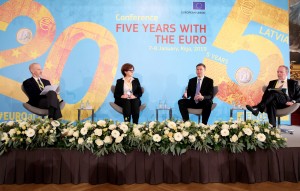Bulgaria is hoping to spend no more than 2 years in the Eurozone “Waiting Room”
“Latvia is a very good example for Bulgaria towards the euro because there are many things in common between the two countries”. This is what Deputy Minister of Finance Marinela Petrova said at a high-level conference on Latvia’s five years with the euro held on 7 and 8 January in Riga. Deputy Minister Petrova took part in the “Challenges of Euro Area Membership” panel. According to her, one of the differences between Bulgaria and Latvia was that our country had not become an ERM II member simultaneously with joining the EU, which had put us a step and a half behind the countries of the former EU enlargement.
Before the participants in the conference, which was co-organised by the European Commission on the occasion of the 20th anniversary of the introduction of the euro as the single currency of the EU, Marinela Petrova reminded that the big financial crisis 10 years ago left a number of lessons learnt and the euro area members, together with the European Commission and the European Central Bank, were trying to develop sustainably after the end of the crisis. “Every state willing to join this club, including Bulgaria, should therefore abide by the new reality and define new solutions”, she said.
Among the challenges Bulgaria faces, according to the Deputy Minister of Finance, were to overcome the negative perceptions and the prejudice to Bulgaria. She drew attention to the fact that Bulgaria had been in a currency board arrangement in the last 20 years or so, that the country’s fiscal stance was stable, the budget balance was positive in most of the years and the country did not count on any financial assistance during the crisis.
“During the Bulgarian Presidency of the Council of the EU our Government decided to accelerate the process of joining the Economic and Monetary Union as we needed to bring our European integration to its natural end”, she noted. The Deputy Minister of Finance reminded that as a rotational chair of the Council of the EU Bulgaria managed to reach a compromise on one of the key files on the package of risk reduction measures in the Banking Union.
In order to tackle the mistrust and the negative perceptions, the Bulgarian Government chose a new approach to enhance the process of joining the euro area. “The first step was to adapt to the new form of the Monetary Union, which the Banking Union, the money-laundering measures and the insolvency are part of. We devoted our efforts to outlining a road map, we passed some legislative texts needed to establish close cooperation with the ECB and we are confident that by the end of June 2019 we will make progress and will move on to the next stage”, she added.
During the panel discussions Marinela Petrova vowed her hope that Bulgaria would manage to meet all the requirements to join the euro within the minimum period of a two-year stay in the Exchange Rate Mechanism II. “There is still some likelihood for this period to be longer. We will do all that we can to make our ERM II stay as shorter as possible”, she specified.





